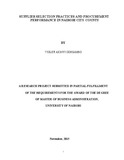| dc.description.abstract | Supplier selection has become one of the elementary roles of supply chain managers since it
virtually affects an organization’s competitiveness. A huge chunk of the organization’s capital
resources is spent on inventory hence it suffices to say; supply chain managers are expected to
contract with suppliers who provide value for their money. Given the advent of long term
supplier relationships that are viewed as business partnerships, it is also paramount to select
suppliers who match the organization’s managerial alignment as they contribute to the overall
performance of an organization. The dynamic rise in market volatility, dynamism and
sophistication, has made managers quickly realize that regardless of their firms’ strength or
product brand in the market they cannot succeed unless they partner up with quality suppliers
whose ultimate focus is to fulfill the customer’s needs. This study discusses the supplier
selection criteria, Principles of supplier selection plus the relationship between supplier
selection and procurement performance. The research adopted a descriptive survey design to
find out the criteria used by Nairobi County to select suppliers. A sample size of 150
respondents was drawn from a list of 500 respondents. Data was collected from the field
through use of questionnaires and then analyzed using SPSS and Excel and presented in tables
and figures. The primary data was collected through use of questionnaires. A five Point Likert
scale that measures the level of agreement or disagreement with selection criteria was
adopted. The study revealed that majority of the respondents was in agreement with the
selection criteria adopted at Nairobi County. The study also revealed that among the numerous
criteria adopted, cost was the most important. Additionally, the findings also revealed that
there was a significant relationship between supplier selection criteria and procurement
performance as the independent variables: quality assessment, service levels, organizational
and supplier profile, as well as cost, were statistically significant at the 95% confidence i.e. pvalue<0.05.Based on the findings the study recommends that policy makers, need to pay
closer attention to technological capacity of suppliers as a selection criterion which registered
the lowest mean of 2.08 compared to other selection criteria. The role of technology in
improvement of procurement performance helps in providing real time information and
reducing lead time. | en_US |

